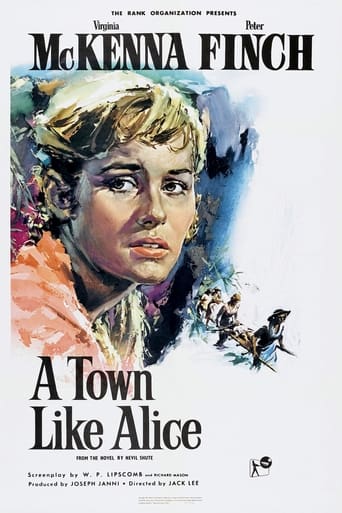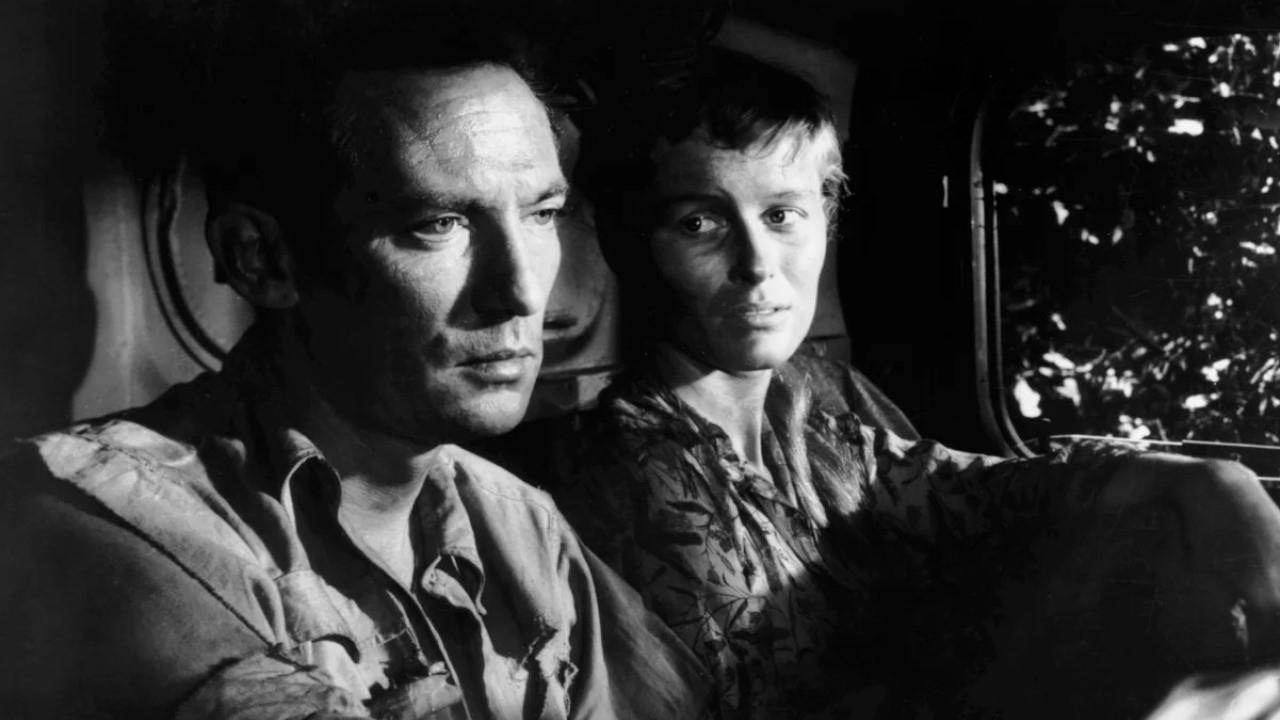fchrist-88106
Just flipping and found film on TCM. I had never heard of it. A pleasant surprise, McKenna stood out, liked her from Born Free. The book might be interesting to read. Thank you TCM.
JohnHowardReid
Copyright 1956 by J. Arthur Rank Film Productions Ltd. New York opening at the Sutton: 21 September 1958 (sic). U.S. release through Rank Film Distributors: September 1958. U.K. release through Rank: 2 April 1956. Australian release through British Empire Films: 16 August 1956. Sydney opening at the State. 10,530 feet. 117 minutes. (Available on a very good Network DVD). SYNOPSIS: Taken prisoners by the Japanese in Malaya, a small group of women and children are sent on an aimless trek through the jungle. There is little or no plot in the half of Shute's book with which the film is concerned. It deals more with a situation. Wives and children, caught in the vanguard of war, are separated from their men-folk and faced with endless jungle wandering. For years they wander from village to village, longing for the haven of a prison camp but never allowed to rest in one. The pathetic little procession, trailing suitcases and carrying babies, winds its way through the paddy-fields and the swamps and over the mountains. Many of them die from fever and exhaustion.NOTES: Number three money-making attraction (after Reach for the Sky and Private's Progress) at the U.K. box office for 1956. B.E.F.'s top-grossing release in Australia for 1956-57. Peter Finch, Best Performance by a British Actor — British Film Academy Award. Virginia McKenna, Best Performance by a British Actress — British Film Academy Award. COMMENT: "A Town Like Alice" is an earnest, sincere but perhaps somewhat plodding movie. Cutting would help, particularly of a wholly extraneous scene in which the women wash themselves (however discreetly) in the baths of an abandoned plantation house. Despite his British Academy Award, Finch's role is actually fairly small. In fact, we actually see little of him at all because most of his scenes are filmed in semi-darkness. At the time of the film's release, much was made of the "crucifixion" sequence. Readers will be glad to know that censors have since taken notice and made some skillful cuts in this scene. This censored version is the one preserved in the British National Film Archive from which the Network DVD has been struck.Film censors certainly move in mysterious ways. I once asked A.T.L. Watkins, the British censor, why he had given a "Suitable for Universal Exhibition" certificate to the cartoon, "Animal Farm". He replied that he felt a "Suitable for Adults" certificate might damage the film's box-office prospects. "A lot of parents might be put off taking their children to the movie," Mr. Watkins said. And yet "Animal Farm" includes sequences of animals being whipped, starved, tortured and worked slowly to death.Now the censor has seen fit to pass "A Town Like Alice" as suitable for Universal Exhibition, even though the whole theme of this picture is the hardships and torture suffered by a dwindling group of English women and children in Japanese-occupied Malaya. It shows prolonged views of the forced marches they undergo, the deaths of most of the children, the beating of the heroine by soldiers and — for a climax — the crucifixion of an Australian soldier against a tree.Leaving aside this strange decision of the censor, "A Town Like Alice" is a moving if harrowing adaptation of Neville Shute's novel.Jack Lee, a young man who learnt his craft in the documentary- making Crown Film Unit, directs it with a sobriety, a conscientious approach and a documentary reticence which are really admirable.
screenman
I suppose that it should be confessed at the outset that I had the hots for Ms McEnna in her youth. Nevertheless, I still think that this is an excellent movie of the 1950's war genre.Ginny and Peter Finch provide typically understated performances that are reminiscent of 'Ice Cold In Alex' and 'The Cruel Sea'. Solid, sterling, stiff-upper-lip-stuff that has no place in the spineless, simpering, metro-sexual third millennium.I have never read Shute's novel, so I cannot comment on what liberties have been taken, but viewed without prejudice as a movie outlining Japanese brutality and human endurance it is still a well-realised piece of work. Everyone gives a thoroughly believable turn, both Caucasian and Oriental alike, as Ms McEnna's character concludes 'you can't really hate anyone' in the end. Though the Japanese - like their Nazi counterparts - did their very best to merit it.Ms McKenna leads a group of unwanted western women and children, for whom no Japanese officer wants responsibility. So; they get shunted from one place to another, on foot, inadequately fed, and without medical assistance. Inevitably; they begin dying. Finch plays a captured Aussie running trucks for the Japanese. Filmed in black-&-white, in Britain and on location, it offers a very believable turn upon the miasmic swamps, crippling heat, humidity and deluging rain.Of course, it's a love story too. And here again Ginny and Peter play their parts to perfection. I defy any true romantic not to be rendered lachrymose by her realisation of his survival and their final meeting at the end. Her hasty, last-minute application of cosmetics is particularly touching and well-observed. As if he'd care a hoot one way or the other.It's a great old feel-good movie for the austerity generation. I give it nine stars and good luck to 'em all I say.
writers_reign
It's often interesting to read comments that are clearly written in haste and not checked before they are posted. For example one comment on this film says it's almost in the same league as Tenko, the author clearly not aware that the BBC television series Tenko, which aired a good two decades after the film, was inspired by the film - and arguably the best selling novel by Nevil Shute on which the film was based. A separate reviewer describes the main protagonist, Jean Paget, as a nurse when we are clearly shown in the initial 'flashback' scene that she is, in fact, a secretary in an office in Kuala Lampur. Virginia McKenna has all the 'English Rose' masking an steely inner core quality that the role requires and it's difficult if not impossible to imagine any other actress of the time inhabiting the role so well - McKenna of course made something of a specialty of world war two heroines and this performance is only a whisker behind her outstanding portrayal of Violette Szabo in Carve Her Name With Pride. Peter Finch, as a native Australian, acting in England less than a decade, was also perfect casting for Joe Harman but as someone has already pointed out, the main thrust of the book was how Jean Paget, receiving a substantial legacy after the war, was inspired to 1) build a well for the Malayan village who had taken her and the rapidly diminishing number of technical prisoners of war, and allowed them to see out the war there working alongside their own women, and 2) create a town in the Australian outback to rival the idealized memory of Alice Springs that Joe had spoken about during the war. It's a fine novel, Shute interviewed at length a woman who had endured such a journey, but as a Master storyteller he blended fact with fiction and there is one notable emission in the film that was crucial to the novel: By the time she first encountered Joe, who was underneath his lorry, she had long abandoned her 'Western' garb for the single, wraparound garment worn by the native women. Joe has only ever seen her clad that way so that when they finally do meet after the war there is a palpable uneasiness between them until Jean realizes what the problem is and exchanges her 'Western' clothes for the wraparound garment. In the film - which makes no reference to Jean creating a virtual town - he steps off the plane, sees her in the waiting room and they fall into an embrace. Despite these cavils it remains a fine film, worth two hours of anyone's time.


 AD
AD


